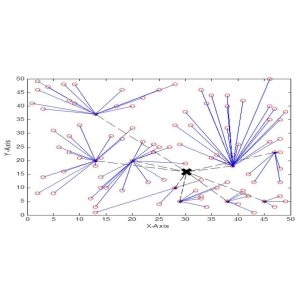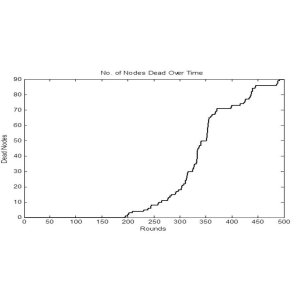Bandwidth-Efficient Cooperative Authentication Scheme for Wireless Sensor Networks
Problem Definition
Problem Description:
One of the key challenges faced in wireless sensor networks is the security of data being transmitted. Injected false data attacks can have severe consequences, leading to errors in the information being transmitted and compromising the reliability of the network. Existing authentication schemes may be ineffective in filtering out these false data attacks, leading to increased energy consumption and burden on the sink node.
To address this issue, there is a need for a more efficient and reliable authentication scheme that can detect and filter out injected false data in wireless sensor networks. The proposed BECAN scheme offers a bandwidth-efficient cooperative authentication method that not only saves energy by detecting false data early on but also reduces the burden on the sink node by filtering data at en-route nodes with minimal overheads.
By implementing the BECAN scheme, the network can benefit from improved reliability, energy efficiency, and a higher probability of filtering out injected false data. This would ultimately enhance the security and performance of wireless sensor networks, making them more resilient to potential security threats.
Proposed Work
The project titled "BECAN: A Bandwidth-Efficient Cooperative Authentication Scheme for Filtering Injected False Data in Wireless Sensor Networks" focuses on addressing the security concerns in wireless sensor networks. With the increasing threat of injected false data attacks compromising the reliability of transmitted information, a novel approach called Bandwidth-efficient Cooperative Authentication (BECAN) is proposed. This scheme aims to detect and filter false data at the earliest to improve system reliability and energy efficiency. By reducing the burden on the sink node and detecting false data with minimal overhead, BECAN proves to be more effective in terms of energy savings and filtering probability compared to conventional techniques. This project falls under the categories of JAVA Based Projects and Wireless Research Based Projects, specifically in the subcategories of Parallel and Distributed Systems, Wireless Security, and WSN Based Projects.
The software used for implementing this scheme includes Java and various wireless sensor network tools.
Application Area for Industry
The proposed BECAN scheme for filtering injected false data in wireless sensor networks has the potential to be widely beneficial across various industrial sectors. Industries that heavily rely on wireless sensor networks, such as manufacturing, agriculture, healthcare, and environmental monitoring, can greatly benefit from the improved security and reliability offered by this scheme. In manufacturing, for example, ensuring the integrity of data transmitted within the network is crucial for maintaining quality control and operational efficiency. By implementing the BECAN scheme, manufacturers can enhance the security of their wireless sensor networks and reduce the risk of errors in data transmission.
Moreover, the proposed solutions of the BECAN scheme can be applied in different industrial domains facing the specific challenge of data security in wireless sensor networks.
By detecting and filtering out injected false data attacks early on, industries can improve the overall reliability and performance of their systems. This project addresses the need for a more efficient and reliable authentication scheme, which can ultimately lead to energy savings and improved network efficiency. Overall, implementing the BECAN scheme in various industrial sectors would not only enhance security but also contribute to increased productivity and operational excellence.
Application Area for Academics
MTech and PHD students can leverage the proposed BECAN scheme in their research work in various ways. Firstly, they can explore innovative research methods in the field of wireless sensor networks by implementing and analyzing the effectiveness of the authentication scheme in detecting and filtering injected false data attacks. This project provides a platform for students to conduct simulations and data analysis to evaluate the scheme's performance metrics such as energy savings, reliability, and filtering probability.
Additionally, MTech and PHD scholars can use the BECAN scheme as a basis for their dissertation, thesis, or research papers in the areas of Parallel and Distributed Systems, Wireless Security, and WSN Based Projects. By studying the code and literature of this project, researchers can enhance their understanding of authentication mechanisms in wireless sensor networks and develop novel solutions to address security concerns.
Furthermore, MTech students can experiment with different network configurations and parameters to explore the potential applications of the BECAN scheme in real-world scenarios. They can study the impact of various factors on the scheme's performance and propose improvements or extensions for future research. PHD scholars can delve deeper into the theoretical aspects of the scheme, refine its algorithms, and validate its effectiveness through extensive simulations and analysis.
In conclusion, the proposed BECAN scheme offers a valuable resource for MTech and PHD students to pursue innovative research methods, simulations, and data analysis in the field of wireless sensor networks. By utilizing this project in their work, researchers can contribute to advancing the knowledge and understanding of authentication mechanisms in wireless networks and improving the security and performance of such systems.
The future scope of this project includes exploring the scalability of the BECAN scheme to larger networks, investigating its compatibility with different sensor node configurations, and integrating additional security features to enhance its robustness against evolving security threats.
Keywords
Wireless Sensor Networks, Security, Injected False Data Attacks, Authentication Scheme, BECAN, Bandwidth-Efficient, Cooperative Authentication, Energy Efficiency, Reliability, Security Threats, JAVA Based Projects, Wireless Research Based Projects, Parallel and Distributed Systems, Wireless Security, WSN Based Projects, Netbeans, Eclipse, J2SE, J2EE, ORACLE, JDBC, Swings, JSP, Servlets, Localization, Networking, Routing, WSN, Manet, Wimax.
| Shipping Cost |
|
No reviews found!





















































No comments found for this product. Be the first to comment!